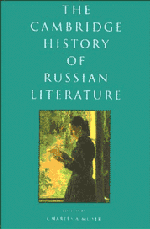Book contents
- Frontmatter
- 1 The literature of old Russia, 988–1730
- 2 The eighteenth century: neoclassicism and the Enlightenment, 1730–90
- 3 The transition to the modern age: sentimentalism and preromanticism, 1790–1820
- 4 The nineteenth century: romanticism, 1820–40
- 5 The nineteenth century: the natural school and its aftermath, 1840–55
- 6 The nineteenth century: the age of realism, 1855–80
- 7 The nineteenth century: between realism and modernism, 1880–95
- 8 Turn of a century: modernism, 1895–1925
- 9 The twentieth century: the era of socialist realism, 1925–53
- 10 The twentieth century: in search of new ways, 1953–80
- 11 Afterword: Russian literature in the 1980s
- Bibliography
10 - The twentieth century: in search of new ways, 1953–80
Published online by Cambridge University Press: 28 March 2008
- Frontmatter
- 1 The literature of old Russia, 988–1730
- 2 The eighteenth century: neoclassicism and the Enlightenment, 1730–90
- 3 The transition to the modern age: sentimentalism and preromanticism, 1790–1820
- 4 The nineteenth century: romanticism, 1820–40
- 5 The nineteenth century: the natural school and its aftermath, 1840–55
- 6 The nineteenth century: the age of realism, 1855–80
- 7 The nineteenth century: between realism and modernism, 1880–95
- 8 Turn of a century: modernism, 1895–1925
- 9 The twentieth century: the era of socialist realism, 1925–53
- 10 The twentieth century: in search of new ways, 1953–80
- 11 Afterword: Russian literature in the 1980s
- Bibliography
Summary
The period from 1953 to 1980 saw Russian literature develop in many different directions both inside and outside the Soviet Union. With Stalin’s death the intense cultural pressures which the guardians of literature had exerted after the Second World War diminished, and with some hesitation literature sought to strike out in unfamiliar channels during the period of the so-called thaw, a name adopted from Erenburg’s timely novel of the day. The thaw continued through the eventual accession of Nikita Khrushchev to power, but there were clearly strict limits to it, as the controversy over Pasternak’s Doctor Zhivago and the award of the Nobel Prize to him in 1958 showed: Pasternak finally rejected the award, and his novel was not published in the Soviet Union for nearly thirty years.
And yet the process of cultural liberalization after Stalin has never been totally reversed. The early 1960s saw the rise to prominence of Alexander Solzhenitsyn, following the publication of his One Day in the Life of Ivan Denisovich in 1962. Solzhenitsyn remained a central figure of the 1960s thanks to the existence of samizdat, since many of his further writings could not be published within the country. It is indicative that he is supremely a writer of prose, and that two mentor-poets of the older generation – Pasternak and Akhmatova – had ceased to exert very direct influence on the younger generation of writers by the early 1960s. The attitude of the authorities toward the energies of the new literature passed through certain phases.
- Type
- Chapter
- Information
- The Cambridge History of Russian Literature , pp. 520 - 594Publisher: Cambridge University PressPrint publication year: 1992

